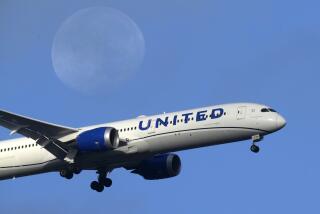Q & A: Rules of Frequent Flying
- Share via
A question-and-answer primer on trading in frequent-flier travel awards:
Question: Is it illegal to sell frequent-flier mileage coupons?
Answer: No. But it is against the rules of the airlines.
Q: I know I’m not supposed to sell my mileage, but can I give it away?
A: It depends on the airline. Every airline except Pan American will allow you to transfer mileage as a gift. On Pan Am, only the frequent-flier program members themselves and one traveling companion may fly. Rules vary from airline to airline. Some, including United, TWA and Delta, require the passenger to be a relative of the program member. Some airlines are stricter than others in policing the rules.
Q: Why do coupon brokers prefer selling first-class and business-class travel rather than coach travel?
A: Because travelers can already get so many discounts from the airlines directly for coach travel that it really doesn’t pay. But brokers can give tremendous discounts, as high as 80%, on first class and business class. There are generally no first-class discounts from the airlines. However, a few brokers do deal in coach travel.
Q: Do the brokers have a preference for specific airlines?
A: This has a lot to so with the transferability restrictions by each airline. The more difficult it is, the more the brokers try to stay clear of that carrier. According to one broker, TWA is not a favorite because it makes transfers difficult. Eastern and Continental have not been on the favorites list because of their service problems.
Q: How can I get a price quote on mileage I wish to sell? And how can I find out how much the tickets I want to buy will cost me?
A: In both cases you can find coupon brokers’ advertisements in many newspapers and magazines. When you have a few names, shop around. The coupon brokers differ in what they pay and what they charge. It is also wise to try to get sense of the reliability of the broker with whom you are dealing. Some are more reliable than others. So the best price is not necessarily the best deal.
Q: How can I find out when travel on free mileage is blacked out?
A: If you are an active member of a frequent-flier program, you will get printed information containing the availability of the airline’s award program. These also include blackout times, usually in the footnotes. You can also call the brokers for such information.
Q: How can I find out how many seats on a certain flight have been allotted for frequent-flier mileage?
A: You can’t. The airlines won’t divulge such information. It is impossible to know if, when you are turned down, it is because the plane is actually fully booked or if the maximum frequent-flier capacity has been reached.
Q: Must I give my frequent-flier mileage to my company if I am a business traveler?
A: There are a few companies that require that. But most companies consider it a perk for their employees. Besides, they have determined it would be too burdensome to police it.
Q: If I am in a frequent-flier program and my wife is as well, can we combine our mileage and sell that mileage to a broker?
A: No, the rules of all programs do not allow any kind of mileage pooling, so the brokers will not pay for pooled mileage.
Q: Are my frequent-flier mileage awards taxable?
A: The Internal Revenue Service has been wrestling with this question almost since the programs began. An IRS spokesman said that if the plane fare on the qualifying flights was paid for by the individual, the bonuses are considered a discount of the fare and are currently not taxable. But they probably will be in the future, he said. If, on the other hand, the free travel is the result of travel paid for by an employer, it is taxable. Cash acquired through the sale of any kind of awards is considered taxable income. However, no regulations have as yet been written concerning any of these matters.
More to Read
Sign up for The Wild
We’ll help you find the best places to hike, bike and run, as well as the perfect silent spots for meditation and yoga.
You may occasionally receive promotional content from the Los Angeles Times.






